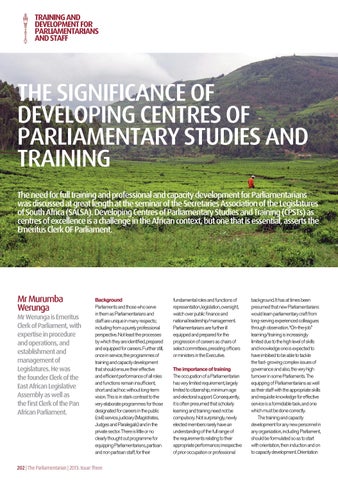TRAINING AND DEVELOPMENT FOR PARLIAMENTARIANS AND STAFF
the significance of developing centres of Parliamentary studies and training The need for full training and professional and capacity development for Parliamentarians was discussed at great length at the seminar of the Secretaries Association of the Legislatures of South Africa (SALSA). Developing Centres of Parliamentary Studies and Training (CPSTs) as centres of excellence is a challenge in the African context, but one that is essential, asserts the Emeritus Clerk OF Parliament.
Mr Murumba Werunga
Mr Werunga is Emeritus Clerk of Parliament, with expertise in procedure and operations, and establishment and management of Legislatures. He was the founder Clerk of the East African Legislative Assembly as well as the first Clerk of the Pan African Parliament.
Background Parliaments and those who serve in them as Parliamentarians and staff are unique in many respects; including from a purely professional perspective. Not least the processes by which they are identified, prepared and equipped for careers. Further still, once in service, the programmes of training and capacity development that should ensure their effective and efficient performance of all roles and functions remain insufficient, short and ad hoc without long-term vision. This is in stark contrast to the very elaborate programmes for those designated for careers in the public (civil) service, judiciary (Magistrates, Judges and Paralegals) and in the private sector. There is little or no clearly thought out programme for equipping Parliamentarians, partisan and non partisan staff, for their
fundamental roles and functions of representation, legislation, oversight, watch over public finance and national leadership/management. Parliamentarians are further ill equipped and prepared for the progression of careers as chairs of select committees, presiding officers or ministers in the Executive. The importance of training The occupation of a Parliamentarian has very limited requirement, largely limited to citizenship, minimum age and electoral support. Consequently, it is often presumed that scholarly learning and training need not be compulsory. Not surprisingly, newly elected members rarely have an understanding of the full range of the requirements relating to their appropriate performance; irrespective of prior occupation or professional
background. It has at times been presumed that new Parliamentarians would learn parliamentary craft from long-serving experienced colleagues through observation. “On-the-job” learning/training is increasingly limited due to the high level of skills and knowledge one is expected to have imbibed to be able to tackle the fast- growing complex issues of governance and also, the very high turnover in some Parliaments. The equipping of Parliamentarians as well as their staff with the appropriate skills and requisite knowledge for effective service is a formidable task, and one which must be done correctly. The training and capacity development for any new personnel in any organization, including Parliament, should be formulated so as to start with orientation, then induction and on to capacity development. Orientation
202 | The Parliamentarian | 2013: Issue Three
Werunga.indd 202
05/11/2013 14:54:10
